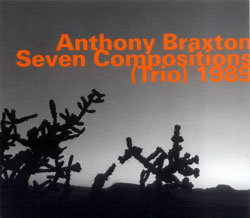
Anthony Braxton's 1989 session with bassist Adelhard Roidinger and drummer Tony Oxley is an interesting sidestep in the composer's massive discography. It's a rare trio session for Braxton, which is itself unusual given that since the days of Sonny Rollins' trio the sax-plus-rhythm section is a de rigeur formation. And while ad hoc meetings were hardly unusual for Braxton in the late '80s, this French convening was an uncommon meeting of minds.
And indeed, most of the four (or eight, depending on how one is given toward counting) Braxton pieces here were originally conceived for quartet, which might account for the nice sense of spontaneous problem-solving that drives Seven Compositions (Trio) 1989. The session opens with two casually realized pulse pieces, compositions 40D and 40G (the latter interpolating Composition 63). As Braxton biographer Graham Lock points out in the liner notes, 40G is one of the few pieces which Braxton overtly references as a blues in his massive Composition Notes. There is perhaps something familiar in the underlying structure, then, that affords Roidinger and Oxley a slow, easy take on the piece. The warmth of their reading leads quite easily into a 10-minute interpretation of the standard "All the Things You Are," relying more on the changes as a vehicle than the melody, with Braxton pushing surprisingly hard on saxophone. They move effortlessly again into "The Angular Apron," a piece Oxley wrote for Braxton shortly before the recording. Braxton conquers the fast repetitions on flute against the soft, thoughtful patter of Oxley's percussion and Roidinger's singing, mellifluous bass. This turns quite easily to Braxton's Composition 6A, the earliest of his pieces here, and one of the more abstract realizations. The set concludes with a return to the 40 series (40J) and a take on 110A interpolating 108B and 69J. The juxtaposition of compositions — what would later be the foundation of Braxton's "Ghost Trance" work — makes for more abstract passages, interspersed with sections of unison playing, and as such more hardcore Braxton. It's easy to assume that the pieces were recorded in the order presented, and whether or not that's the case it's a satisfying arrangement: pulse variations, takes on a couple heads, and then the multilinear meat and potatoes.
As the pinch-hitter here, Roidinger proves an elegant member of the trio. Braxton and Oxley had played together as early as 1976, and both had recently been a part of the London Jazz Composers Orchestra at the time of this session. Although certainly not as well known as the other two, Roidinger had already worked with Joachim Kühn, George Russell, Kenny Clarke, Mal Waldron and Woody Shaw at the time of this recording. His presence here makes for a compelling argument that Braxton's ever-heady music is viable, at least in the right hands, as jazz tunes for a pick-up band.
Comments and Feedback:
|



